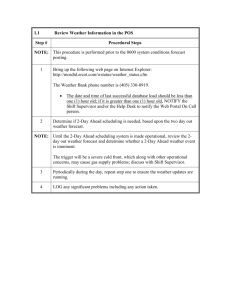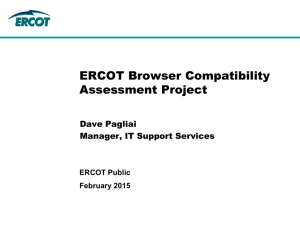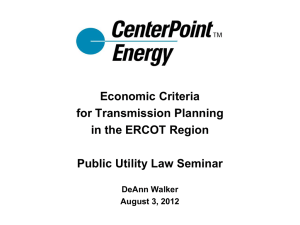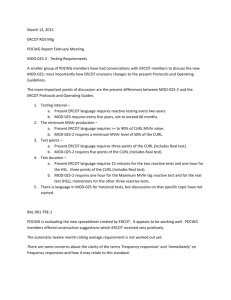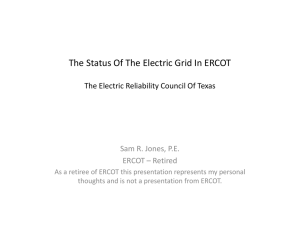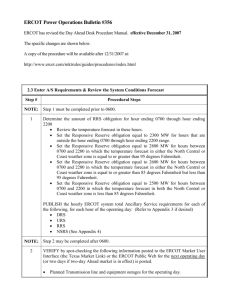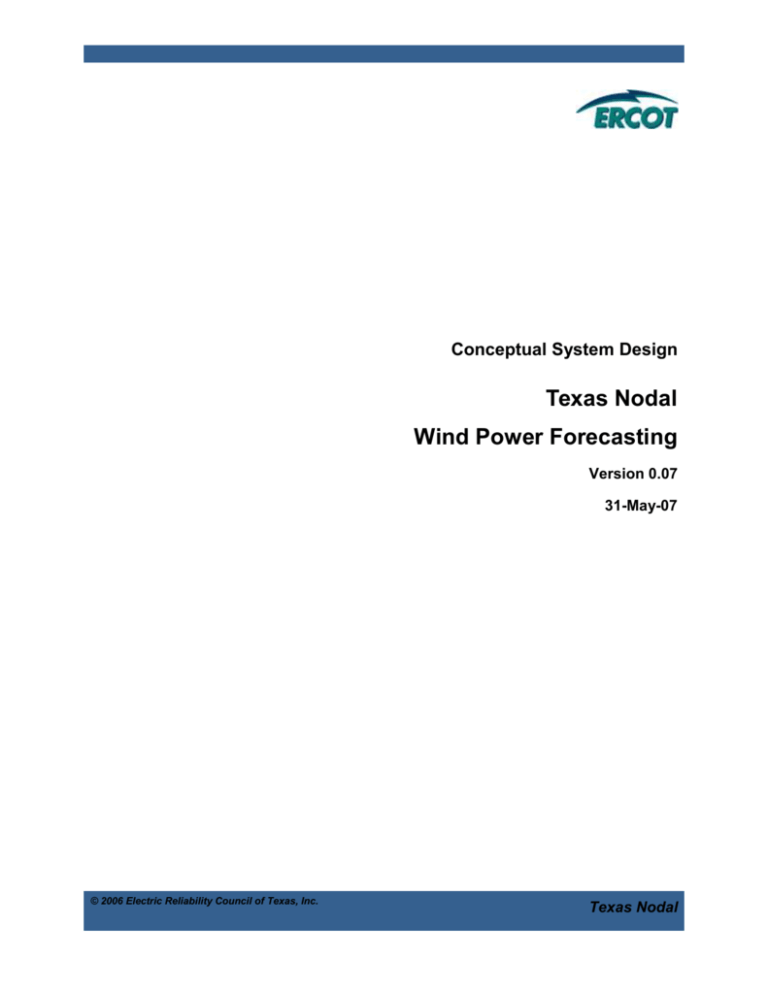
Conceptual System Design
Texas Nodal
Wind Power Forecasting
Version 0.07
31-May-07
© 2006 Electric Reliability Council of Texas, Inc.
Texas Nodal
Texas Nodal Wind Power Forecasting
Conceptual System Design
Template Name and Version: TN.PC.ConceptualSystemDesignTemplate 1.0
Document Version: 0.07
Date: 31-May-07
ERCOT Public
Document Revisions
Date
Version
Description
Author(s)
9/7/06
0.01
First draft
John Zack
03/17/07
0.02
Added in ERCOT internal Comments. Updated
diagram from AWST
Bill Blevins
03/27/07
0.03
Reformatted the CSD to the current ERCOT
Template and corrected typos and details
based on ERCOT internal feedback and AWS
Truewind feedback.
Bill Blevins
04/03/07
0.04
Incorporated IDA comments from Bill Griffith
and John Adams. Incorporated Internal EMS
Comments.
Bill Blevins
05/04/07
0.05
Incorporated comments from TPTF.
Bill Blevins
05/21/07
0.06
Incorporated comments from meetings
05/14/07 Reliant and 05/15/07 FPLE.
Incorporated ERCOT clarifications.
Bill Blevins
05/31/07
0.07
Modified the requirement for meteorological
tower height based upon TPTF comments.
Bill Blevins
Document Approvals
Date
Approved By
Approval Documented In (select)
<Name>
___ Approval email on file
___ Signature
<Role>
© 2006 Electric Reliability Council of Texas, Inc. All rights reserved.
Texas Nodal Wind Power Forecasting
Conceptual System Design
Template Name and Version: TN.PC.ConceptualSystemDesignTemplate 1.0
Document Version: 0.07
Date: 31-May-07
ERCOT Public
Table of Contents
1
INTRODUCTION ..............................................................................................................................................4
1.1
1.2
1.3
1.4
1.5
1.6
1.7
2
OVERVIEW .......................................................................................................................................................9
2.1
2.2
2.3
3
HARDWARE INTERFACES ........................................................................................................................... 19
SOFTWARE INTERFACES ............................................................................................................................ 19
SERVICES INTERFACES .............................................................................................................................. 19
DATABASE INTERFACES ............................................................................................................................ 19
LICENSING REQUIREMENTS ....................................................................................................................... 19
SUPPLEMENTARY SPECIFICATIONS ..................................................................................................... 20
5.1
5.2
5.3
5.4
5.5
5.6
5.7
5.8
6
ERCOT-WGR INPUT DATA PREPARATION ................................................................................................ 12
AWST-REGIONAL PHYSICS-BASED WEATHER FORECAST ........................................................................ 13
AWST-STATISTICAL BASED FORECAST..................................................................................................... 14
AWST-WGR FORECAST ........................................................................................................................... 15
AWST-ERROR ANALYSIS .......................................................................................................................... 15
AWST & ERCOT- DISPLAYS ................................................................................................................... 16
ERCOT- POST AND ARCHIVE WIND POWER FORECAST DATA .................................................................. 17
ERCOT-LTWPF PROVIDED FROM WGR ENTITIES ................................................................................... 18
SYSTEM DEPENDENCIES & DESIGN CONSTRAINTS ......................................................................... 19
4.1
4.2
4.3
4.4
4.5
5
DESIGN GOALS ............................................................................................................................................9
DESIGN APPROACH .....................................................................................................................................9
DELIVERY MECHANISM & SCHEDULE ....................................................................................................... 11
FUNCTIONAL SPECIFICATION ................................................................................................................ 12
3.1
3.2
3.3
3.4
3.5
3.6
3.7
3.8
4
PURPOSE......................................................................................................................................................4
SCOPE..........................................................................................................................................................4
DEFINITIONS, ACRONYMS, AND ABBREVIATIONS ........................................................................................5
REFERENCES ...............................................................................................................................................5
OVERVIEW ..................................................................................................................................................6
PROGRAM-LEVEL STANDARDS ....................................................................................................................7
DEVIATIONS FROM PROGRAM-LEVEL STANDARDS ......................................................................................8
PERFORMANCE .......................................................................................................................................... 20
LEGAL AND REGULATORY......................................................................................................................... 20
SYSTEM AND COMMUNICATION ................................................................................................................ 20
SYSTEM SECURITY .................................................................................................................................... 20
BACK UP AND RECOVERY.......................................................................................................................... 21
AVAILABILITY AND REDUNDANCY............................................................................................................ 21
MAINTAINABILITY .................................................................................................................................... 21
USABILITY................................................................................................................................................. 21
APPENDIX A: SUBSYSTEM MAPPING TO NODAL SOSA ................................................................... 22
© 2006 Electric Reliability Council of Texas, Inc. All rights reserved.
i
Texas Nodal Wind Power Forecasting
Conceptual System Design
Template Name and Version: TN.PC.ConceptualSystemDesignTemplate 1.0
1
Document Version: 0.07
Date: 31-May-07
ERCOT Public
Introduction
ERCOT’s current Zonal system does not include a Wind Power Forecasting (WPF) service and therefore
forecasts are provided by the resources. The rapid growth of wind resources in the ERCOT grid have
given rise to requirement for a more detailed forecast for short term operating and reliability studies. As
ERCOT moves to the Nodal LMP market, an opportunity to improve the forecasting of Wind Power
Generation Resource (WGR) was approved. ERCOT has contracted to AWS Truewind service to provide
this short term forecast.
ERCOT will provide a WPF system to provide Short Term Wind Power Forecast (STWPF) for the next 48
hours. ERCOT will also provide a interface for WGRs to submit the Long Term Wind Power Forecast
(LTWPF). The WPF system refers to the entire system used to provide the STWPF and the LTWPF. This
Conceptual System Design will address the scope of the WPF system and provide a greater level of
detail on how the integrated system will work together. The integrated system is a combination of ERCOT
Nodal systems and a forecasting service from AWS Truewind.
The Functional Requirements (Section 3) are organized as follows:
Section 3.1 addresses ERCOT requirements to provide input data to the AWST vendor for use in
the short term forecast. Section 3.1.3 describes the telemetered information provided by WGRs to
ERCOT via their QSEs SCADA.
Section 3.2 through 3.5 addresses functions being performed by AWST to produce the short term
forecast.
Section 3.6 addresses both functions that ERCOT and AWST will perform.
Section 3.7 and 3.8 addresses functions that ERCOT will develop and maintain for archiving and
posting.
Note: The title of the functional requirement specifies which Entity ERCOT or AWST is providing a
specific functional requirement.
1.1
Purpose
The purpose of the WPF system is to produce forecasts of Renewable Production Potential (RPP) for
Wind Powered Generation Resources (WGR) to be used as an input into the Day-Ahead Reliability Unit
Commitment (DRUC) and Hour-Ahead Reliability Unit Commitment (HRUC).The system shall provide
forecasts for each WGR to the QSEs representing WGRs. The QSEs shall use the ERCOT provided
forecasts for WGRs throughout the Day-Ahead and Operating Day for applicable markets and
RUCs.Additionally the purpose is to allow WGRs to submit the LTWPF for their to ERCOT and their
respective QSE.
1.2
Scope
This project is a subsystem of the Nodal EMS project. The scope of this subsystem is defined by the
Texas Nodal EMS Wind Power Forecasting Requirements Specification which comprises requirements
specified by Texas Nodal Protocols sections 3.13 and 4.2.2.
© 2006 Electric Reliability Council of Texas, Inc. All rights reserved.
4 of 22
Texas Nodal Wind Power Forecasting
Conceptual System Design
Template Name and Version: TN.PC.ConceptualSystemDesignTemplate 1.0
1.3
Document Version: 0.07
Date: 31-May-07
ERCOT Public
Definitions, Acronyms, and Abbreviations
Term
AWST
DMZ
DSL
EDW
FTP
GARF
HTTPS
LTWPF
MIR
MIS
MPIM
QSE
SCADA
SSL
STWPF
TLS
WGR
WGRPP
WPF
1.4
Definition
AWS Truewind is the vendor ERCOT has contracted to perform short term
wind forecasting.
The demilitarized zone (DMZ) or perimeter network is a network area (a
subnetwork) that sits between an organization's internal network and an
external network, usually the Internet
Digital Subscriber Line
EIS data services and products to support the nodal market, System designed
to provide the appropriate access and toolsets and storage necessary for the
IMM and PUCT oversight functions. Compised of Replicated Source System
(RSS), Operational Data Store (ODS), Market Information Repository (MIR)
and Conformed Data Warehouse (CDW).
File Transfer Protocol is used to transfer data from one computer to another
over the Internet, or through a network.
Generation Asset Registration Form
https is a URI scheme used to indicate a secure HTTP connection.
Long-Term Wind Power Forecast: A facility operator produced forecast of
power production, which is a “typical” energy profile for each day of a future
month out to one year.
Market Information Repository The MIR system will be a database-centric
system for file management of Market information.
(Market Information system) Web portal that provides a single point of access
for Market Participants, PUCT, and ERCOT staff to Nodal market information
and ERCOT market-facing applications.
The Market participant Identity Management System is a component system of
ERCOT that has no separate enterprise use cases but it does take part in
each and every interaction between ERCOT’s guarded resources and Market
participants.
Qualified Scheduling Entity
Supervisory Control and Data Acquisition (SCADA) of the Energy
Management System.
Secure Sockets Layer
Short-Term Wind Power Forecast: An ERCOT produced hourly forecast of
wind-power energy production potential for each WGR.
Transport Layer Security
Wind Power Generation Resource: A generation resource that is powered by
wind.
Wind-Powered Generation Resource Production Potential: An ERCOT
produced hourly forecast of wind-power energy production potential output
with an 80% confidence level that the facility will exceed.
Wind Power Forecasting System including the internal and external systems
that comprise Market Participant, ERCOT and Wind Forecasting vendor
systems.
References
ERCOT Nodal Protocols, January 1, 2007,
http://nodal.ercot.com/protocols/2007/01/January%201%202007%20Nodal%20Protocols.zip
Wind Power Forecasting Requirements Specification v1.0, 9 Mar 2007,
http://nodal.ercot.com/docs/pd/ems/pd/wpforc/TN.EMS.61C01.WindPowForecastingReqSpec.doc
© 2006 Electric Reliability Council of Texas, Inc. All rights reserved.
5 of 22
Texas Nodal Wind Power Forecasting
Conceptual System Design
Template Name and Version: TN.PC.ConceptualSystemDesignTemplate 1.0
1.5
Document Version: 0.07
Date: 31-May-07
ERCOT Public
Overview
The ERCOT nodal WPF system requires information from many systems and subsystems of the ERCOT
nodal system and from the WGRs and QSEs representing the WGRs. Outbound information will be
information that ERCOT provides to the AWST forecasting service and inbound information will be data
that is transferred from the AWST forecasting service to ERCOT. Outbound AWST will require information
from the following ERCOT systems: SCADA subsystem, Outage Scheduler subsystem, Registration
subsystem data, and EMS Oracle database. This is accomplished using an AWS Truewind
communication’s server. On the outbound the WPF system will consolidate the required data from the
ERCOT systems and then deliver this input information to the AWS True Wind server. AWST will then
create a short term (48 hour) forecast. Inbound the AWST communication server will deliver the forecast
to ERCOT. This information will be provided to the QSE via the Messaging System, posted on the Market
Information System and archived in the EDW system. A QSE representing a Wind-Powered Generation
Resource (WGR) must enter an HSL value that is less than or equal to the amount for that Resource from
the most recent Wind-Powered Generation Resource Production Potential provided by ERCOT. AWST
will deliver ERCOT the hourly STWPF and WGRPP forecast. Daily the AWST service will provide ERCOT
the WPF performance analysis information and ERCOT will post and archive this information for market
reporting purposes. The reader should understand that in reading this document the AWST vendor will
be specifically performing the functions contained in Figure 1 (within the shaded area). ERCOT will
manage the processes outside the shaded area. The LTWPF is required by protocol language to be
submitted by WGR Entities to ERCOT and their QSEs. This is not being performed by the AWST
forecasting system or ERCOT. The LTWPF interface will require the WGR to submit the LTWPF. ERCOT
will provide a web service for the LTWPF submission.
The WPF system will provide a user interface to display the forecast and performance data. This ERCOT
operator user interface will support large geographic displays as well as database-driven tabular displays
used to monitor the process of preparing, transferring and receiving forecast information with AWST. File
transfer failures will issue alarms to the EMS support teams.
Typically, the WPF system requires a high level of availability with no schedule downtime and is expected
to be running 24 hours a day, 365 days a year. Section 5.6 of the Conceptual System Design document
addresses the redundancy and availability of the servers at AWS Truewind.
© 2006 Electric Reliability Council of Texas, Inc. All rights reserved.
6 of 22
Texas Nodal Wind Power Forecasting
Conceptual System Design
Template Name and Version: TN.PC.ConceptualSystemDesignTemplate 1.0
Document Version: 0.07
Date: 31-May-07
ERCOT Public
Figure 1 - Wind Power Physical Deployment View
1.6
Program-level Standards
Where applicable, the Nodal EMS conforms to official or de facto standards as much as possible. These
include:
Official Standards:
1. C++, C, and Fortran ANSI programming languages
2. SQL for data exchange with RDBMS
3. IEC 60870-5-101,-103,-104, DNP3 for serial and TCP/IP communication with RTUs
4. IEC 61850 for communication with IEDs
5. Modbus Serial and TCP/IP for communication with IEDs
6. IEC 60870-6 TASE.2 (1996 & 2000), TASE.1 (ELCOM 90) for inter-control center communication,
with optional secure protocol using X.509 certificates
7. IEC 61970 part 301 CIM Model standard
© 2006 Electric Reliability Council of Texas, Inc. All rights reserved.
7 of 22
Texas Nodal Wind Power Forecasting
Conceptual System Design
Template Name and Version: TN.PC.ConceptualSystemDesignTemplate 1.0
Document Version: 0.07
Date: 31-May-07
ERCOT Public
Defacto Standards:
8. Microsoft Windows 2003 32-bit, 64-bit for server applications
9. Microsoft Windows XP for client applications
10. Microsoft SQL Server (2005) for historical RDBMS
11. Red Hat Linux Enterprise License 3.0 for server applications
12. AIX 5L version 5.3
13. Oracle RDBMS (10g) for historical RDBMS and market applications
14. AREVA ISD Protocol for front-end communication with SCADA
Security Standards:
15. North American Electric Reliability Council “DRAFT Critical Infrastructure Protection Standards 29 Cyber Security”, May 9, 2005”
16. North American Electric Reliability Council “Urgent Action Standard 1200 – Cyber Security”,
August 13, 2003
17. Department of Energy “21 Steps to improve Cyber Security of SCADA Networks”
18. US – Canada Power System Outage Task Force “Final Report on the August 14, 2003 Blackout
in the United States and Canada: Causes and Recommendations”, April 2004
1.7
Deviations from Program-level Standards
This CSD is compliant with all Nodal program-level standards.
© 2006 Electric Reliability Council of Texas, Inc. All rights reserved.
8 of 22
Texas Nodal Wind Power Forecasting
Conceptual System Design
Template Name and Version: TN.PC.ConceptualSystemDesignTemplate 1.0
2
Overview
2.1
Design Goals
Document Version: 0.07
Date: 31-May-07
ERCOT Public
The objective of the forecasting service system is to create a forecast service which will provide ERCOT
with the most accurate STWPF and WGRPP forecasts possible. The forecasts will be updated hourly
and cover 1-48 hours from the forecast update time. The service will be developed to provide an
extremely high level of reliability with over 99.8% of day ahead and hourly forecasts delivered on time.
ERCOT has contracted to AWS Truewind for their forecasting service given their extensive experience in
Wind Power Forecasting and research. Additionally, traditional forecasts from WGRs for LTWPF will be
supported via web services. The LTWPF, STWPF and WGRPP will be integrated into a WPF system to
address both Long-Term (one year) and Short-Term (48 hr) forecasts.
2.2
Design Approach
ERCOT will place all WGR Registration, EMS real-time and Outage Scheduler hourly data in an AWST
communication server. The server will deliver the input data to AWS Truewind hourly. Currently AWST
supports both CSV-FTP and web services. The detail design specification will specify the method ERCOT
will use to communicate. Since the source system for registration data and outage scheduler data is an
Oracle database, the WPF system will pull this data from the source database to the WPF staging
database. EMS real-time SCADA data is stored in Areva’s proprietary database, Habitat. Therefore,
Areva’s eTerra Archive software product will be used to extract the SCADA data from the proprietary
format and transfer it to the WPF Oracle staging database. Once all of the data has been organized and
consolidated, the WPF system will transfer this data to the AWST communication server for
communication to the AWS Truewind servers. AWST will then create and provide a 48 hour rolling
WGRPP and STWPF forecast to ERCOT before the next operating hour.
The AWST forecasting system consists of several elements. Each component of the system will have at
least one backup. A physical weather model will be used to forecast conditions over the entire state of
Texas for the 48 hour forecasting period. The model provides the capability to make a forecast even
when ERCOT provided WGR data is unavailable. A second component of the AWST system will be a
statistical model. The statistical model uses plant data to eliminate bias in the physical model forecast
and to provide information about recent trends in the power production which are valuable predictors in
the first few hours of the forecast period. The statistical model will be able to function with only historical
data although current data will significantly improve the first few hours of the forecast. A delivery control
system will be put in place to ensure that the forecast is sent from one of several redundant systems.
The forecast will be delivered via the internet. To ensure reliability, two connections to the internet will be
maintained (e.g., a T3 connection with a DSL connection as a backup). The forecast systems will be
located behind a firewall in a server room monitored for unauthorized access and environmental
conditions (temperature, humidity, liquid water etc.).
2.2.1
System functional capabilities
The WPF system functional capabilities include:
Provide input to AWST for use in creating an hourly WPF forecast
Provide a 48 hr STWPF for each WGR from AWST
Provide a 48 hr STWPF for ERCOT from AWST
Provide a 48 hr WGRPP for each WGR from AWST
© 2006 Electric Reliability Council of Texas, Inc. All rights reserved.
9 of 22
Texas Nodal Wind Power Forecasting
Conceptual System Design
Template Name and Version: TN.PC.ConceptualSystemDesignTemplate 1.0
2.2.2
Document Version: 0.07
Date: 31-May-07
ERCOT Public
Provide a 48 hr WGRPP for ERCOT from AWST
Provide Error Analysis for the STWPF and WGRPP from AWST
Provide an LTWPF from WGR entities
Post and archive all WPF information
Black Box View
Figure 1 depicts the physical computer servers that will realize the logical dataflow. Figure 2 depicts the
conceptual view of the forecasting system. Figure 3 provides the conceptual view to show the logical data
flow of the system including the input and output from ERCOT to AWS Truewind. Together, these
diagrams provide a high-level view of the WPF system to be designed.
It is anticipated that the WGR data files sent from ERCOT to AWS Truewind will be on the order of 1 kb
for each wind generator for each hour that data is to be sent. Forecast files received at ERCOT from AWS
Truewind will be approximately 5 kb per wind generator.
All processing to create the forecast will be done at AWS Truewind facilities. Processing of the physics
based model used in making the forecasts will occur separately from the running of the statistical models
and other forecast processing as it will take substantially more processing time than other forecast system
components. The physics based model will be updated 2 to 4 times per day and the other components of
the system will use the most recent available physics based model data. It is anticipated that the forecast
system will require 15 minutes or less to generate a forecast from the time new ERCOT data is received
by AWS Truewind.
Figure 2 - eWind Conceptual View
© 2006 Electric Reliability Council of Texas, Inc. All rights reserved.
10 of 22
Texas Nodal Wind Power Forecasting
Conceptual System Design
Template Name and Version: TN.PC.ConceptualSystemDesignTemplate 1.0
Document Version: 0.07
Date: 31-May-07
ERCOT Public
Figure 3 - Wind Power Data Flow
2.3
Delivery Mechanism & Schedule
All processing will be done at AWS Truewind facilities. ERCOT will provide a method of sending CSV flat
file or web service information containing generator data to AWS Truewind and a method of receiving
CSV flat file or web service information containing the forecast data from AWS Truewind. Transmission
of the data will be via the Internet over a secure channel using digital certificates either as Secure FTP or
Web Services over HTTPS.
AWST Truewind will deliver forecast data to ERCOT via the Internet over a secure channel as well.
AWST Truewind will use Secure FTP or Web Services over HTTPS with the use of digital certificates.
Forecasts will be available for delivery 15 minutes after AWS Truewind receives plant data from ERCOT.
ERCOT will be free to determine the delivery time of the data to QSEs and the MIS System (and thus the
forecast) so that scheduling time constraints may be met.
© 2006 Electric Reliability Council of Texas, Inc. All rights reserved.
11 of 22
Texas Nodal Wind Power Forecasting
Conceptual System Design
Template Name and Version: TN.PC.ConceptualSystemDesignTemplate 1.0
3
Functional Specification
3.1
ERCOT-WGR input data preparation
3.1.1
Traceability to Requirement(s)
Document Version: 0.07
Date: 31-May-07
ERCOT Public
RPP-FR1, RPP-SR8, RPP-SR9, RPP-SR11
3.1.2
Introduction
WGR entities must provide Registration, Outage Scheduler and Real-Time telemetry data to be used as
an input to the AWST forecast Models. ERCOT will receive the SCADA information for the WGR from the
WGRs QSE. The WPF system will receive the Registration and Outage Scheduling information as WGRs
provide it to those new Nodal systems
3.1.3
Inputs & Sources
Input data consists of operational data, Registration data and outage data. All the operational input data
will be telemetered via SCADA from the WGR to its QSE and then to ERCOT via ICCP. This data is then
inserted into a database at ERCOT before being sent to the AWST forecasting service. This SCADA data
will belong to current hour and any integration of wind speed or mw output will be done in the ERCOT
SCADA system. Static-data will be sent to AWST when Registration changes are made via Market
Participant Generation Asset Registration Forms (GARF) changes. The expectation is that current and
new Wind Generation facilities will have the required meteorological data from meteorological towers
located at the site. Wind Generation facilities meteorological tower height will be documented through
Registration (GARF). Daily-data will be sent to AWST once per day. All other information will be sent to
AWST hourly.
Registration data:
RESOURCE NAME
RESOURCE-QSE MAPPING
RESOURCE PARAMETERS MAX AND MIN REASONABILITY LIMITS (UNITS MW)
LOCATION OF WIND FARM LATITUDE AND LONGITUDE FOR THE CENTER POINT OF WIND FARM
(UNITS DECIMAL DEGREES)
LOCATION OF THE METEOROLOGICAL TOWER LATITUDE AND LONGITUDE (UNITS DECIMAL
DEGREES)
TYPE (MANUFACTURER/MODEL) AND NUMBER OF TURBINES
TURBINE HUB HEIGHT(S) ABOVE GROUND LEVEL WITH ASSOCIATED NUMBER OF TURBINES (UNITS
METERS)
METEOROLOGICAL TOWER HEIGHT
MANUFACTURER’S POWER CURVE (CAPABILITY CURVE)
Resource Commercial Operation Date
Outage Scheduler data:
SCHEDULED OUTAGES/DERATES OF WIND FARMS
SCADA data:
RESOURCE (WIND FARM) STATUS ON LINE/OFF LINE WITH DATE/TIME
MW OUTPUT OF WIND FARM WITH DATE/TIME
© 2006 Electric Reliability Council of Texas, Inc. All rights reserved.
12 of 22
Texas Nodal Wind Power Forecasting
Conceptual System Design
Template Name and Version: TN.PC.ConceptualSystemDesignTemplate 1.0
3.1.4
Document Version: 0.07
Date: 31-May-07
ERCOT Public
W IND SPEED (UNITS MPH)
W IND DIRECTION FROM ONE METEOROLOGICAL TOWER WITH DATE/TIME
TEMPERATURE (UNITS °C)
BAROMETRIC PRESSURE AT 2 M ABOVE GROUND LEVEL ON THE METEOROLOGICAL TOWER (UNITS
HPA (MB))
Processing
The operational input data will be transferred through e-terra archive software from EMS real-time
database to EMS relational database. The ERCOT SCADA system will integrate the WGR MW and Wind
Speed values over the hour. The other SCADA values will be instantaneous snapshot values. SCADA
information will be written to an Oracle database using e-Terra Archive systems that are delivered as part
of the EMS. The Registration data and outage scheduler data will be transferred through data transfer
procedures to EMS relational database. Registration data will be used so that AWST wind farm
forecasted information can be accurately developed based upon physical specifications of the Wind
Farm. Static Registration information will be sent to AWST. Also this information must be used when
mapping forecast to specific QSEs. This is provided from the ERCOT Registration system. Outage
Scheduler information will be provided as a file from Outage Scheduler listing all WGR outages for the
next 48 hours. From EMS relational database, every hour data will be extracted and placed on the FTP
server to be picked up by AWS Truewind for processing Wind Power Forecast. Before using this data by
Statistical Atmospheric model, a quality code check process will be running by AWS Truewind for validity
of input data. This is to ensure that the input information such as MW values are non-negative and within
the maximum capability of each WGR and to confirm the information is not old, i.e. it changes from one
hour to the next.
3.1.5
Outputs & Targets
ERCOT components of WPF will create a CSV flat file or web service data transfer containing the input
data listed in 3.13 for use by AWS Truewind as input for the forecast.
3.2
AWST-Regional Physics-Based Weather forecast
3.2.1
Traceability to Requirement(s)
RPP-FR1, RPP-FR2
3.2.2
Introduction
The AWST uses regional physics-based models to create sets of forecast atmospheric data for the region
around the resources to be forecast for. This data is used as an input to the statistical models. This
physics based model is used by AWST to improve the forecasting accuracy.
3.2.3
Inputs & Sources
Input data consists of regional weather data (surface observations, Doppler radar wind data, and
Rawinsonde) collected by the National Weather Service and data from larger-scale physics-based
models run at government centers such as the National Center for Environmental Prediction obtained by
AWS Truewind.
© 2006 Electric Reliability Council of Texas, Inc. All rights reserved.
13 of 22
Texas Nodal Wind Power Forecasting
Conceptual System Design
Template Name and Version: TN.PC.ConceptualSystemDesignTemplate 1.0
3.2.4
Document Version: 0.07
Date: 31-May-07
ERCOT Public
Processing
The regional physics-based models numerically solve a set of equations describing the atmosphere. Of
the several models available to AWS Truewind, primarily AWST uses MASS and WRF. MASS is a model
developed by Meso INC a partner in AWS Truewind. WRF is a community research and forecasting
model developed cooperatively by several government agencies. Physics-based models output grids of
atmospheric variables. The frequency of output is configurable. The models will be updated every six to
12 hours using the input regional weather data mentioned in 3.2.3.
3.2.5
Outputs & Targets
Grids of forecast meteorological variables are output by the models at user-specified intervals over the
forecast time period for use by AWST forecast. Note: This weather grid is a list of weather variables and
is used by AWST. This weather variable grid is not being provided to ERCOT.
3.3
AWST-Statistical based forecast
3.3.1
Traceability to Requirement(s)
RPP-FR1, RPP-FR2
3.3.2
Introduction
Statistical models are used to refine the forecast from the regional physics-based models by comparing
model output to observed data from the plant and eliminating biases in the physics-based model output.
Bias is systematic error in the output of the physical weather model. One example of a bias would be a
forecast of winds which is too low on a narrow ridge because the physical model resolution does not allow
the full height of the ridge to be captured. The statistical model compares observed data to the physical
model output to eliminate such biases. The statistical models are also used to incorporate recent plant
data into the forecasts.
3.3.3
Inputs & Sources
The statistical models will use historical model and plant data and current model and plant data. AWST
will use off-site meteorological data when appropriate. ERCOT will own the private Market Participant
data it provides to AWST and the forecasts produced under 2.2.1 and performance data that AWST
provides to ERCOT. AWST owns the Regional weather data it subscribes to which will not be made
available to ERCOT for posting but will be made available upon request by ERCOT for dispute resolution
when necessary.
3.3.4
Processing
Several statistical models are available to choose from. AWS Truewind has experience with neural
networks, support vector machines, multiple linear regression and others. The various models have
different requirements for the amount of data to produce a reliable forecast and the length of time needed
to run. AWS Truewind will select an appropriate model or models to run which function well within the run
time available and makes maximum use of the available data.
3.3.5
Outputs & Targets
The statistical models will output a forecast of the wind speed at a meteorological tower or may directly
output a forecast of plant generation. These variables are not being directly provided to ERCOT.
© 2006 Electric Reliability Council of Texas, Inc. All rights reserved.
14 of 22
Texas Nodal Wind Power Forecasting
Conceptual System Design
Template Name and Version: TN.PC.ConceptualSystemDesignTemplate 1.0
3.4
AWST-WGR forecast
3.4.1
Traceability to Requirement(s)
Document Version: 0.07
Date: 31-May-07
ERCOT Public
RPP-FR1, RPP-FR2, RPP-SR7
3.4.2
Introduction
The plant output model converts a forecast of wind speed at a plant to power output.
3.4.3
Inputs & Sources
The plant output model requires observed meteorological and generation data from the plant. It also uses
forecast meteorological data.
3.4.4
Processing
When limited plant data is available the plant output model, will consist of a turbine manufacturer’s power
curve. When adequate plant data is available a statistical facility-scale power curve will be constructed
using the measured data. It is also possible that a statistical model such as an artificial neural network
might be used to construct a more complex relationship between the meteorological data, the model data,
and the observed generation.
3.4.5
Outputs & Targets
The plant output model creates a STWPF and WGRPP forecast of generation for each plant. AWST will
provide these forecast to ERCOT through the AWST communication server.
3.5
AWST-Error analysis
3.5.1
Traceability to Requirement(s)
RPP-SR4, RPP-SR5, RPP-SR6
3.5.2
Introduction
AWS Truewind will run process to produce the error analysis for performance monitoring. Everyday along
with 0600 hour’s Wind Power Forecast data, it will send the error analysis of the forecasted versus the
actual WGR production data for last 24 hours through CSV flat file or web service AWS Truewind is also
responsible for archiving and providing the data used to perform the STWPF upon request. This will
require AWST to have the meter information from the WGR to calculate the forecast error.
3.5.3
Inputs & Sources
AWS Truewind will use the actual and Wind Power Forecast data to perform this process.
3.5.4
Processing
AWS Truewind will develop the process to generate the error analysis data for last 24 hours. After that
data is available to ERCOT through CSV flat file or web service, it will be stored in EMS RELATIONAL
database which process will be developed by ERCOT.AWST will provide the following Error analysis
information.
Forecast Availability for Day-Ahead Operations
The WPF Process shall calculate statistics comparing the forecasts to the actual total ERCOT
wind-power output and the output of wind farms.
mean forecast WGRPP and STWPF (48 rolling forecast)
© 2006 Electric Reliability Council of Texas, Inc. All rights reserved.
15 of 22
Texas Nodal Wind Power Forecasting
Conceptual System Design
Template Name and Version: TN.PC.ConceptualSystemDesignTemplate 1.0
actual
WGRPP and STWPF mean error (bias)
WGRPP and STWPF absolute mean error
WGRPP and STWPF RMS error
Measure of dispersion (standard deviation) for total ERCOT wind-power production for each
hour-of-day by month
Measure of dispersion (standard deviation) for each WGR for each hour-of-day by month
STWPF Forecast Accuracy
WGRPP Forecast Accuracy
Wind Speed Forecast Accuracy
3.5.5
Document Version: 0.07
Date: 31-May-07
ERCOT Public
Outputs & Targets
AWST will provide the error statistics along with the Wind Generation metered output to allow ERCOT to
easily relate the statistics to the WGR production for any particular time. The error analysis data and
actual wind power production data for last 24 hours, which is used to perform STWPF error analysis are
the required values necessary to relate the hourly forecast to the error. AWST will provide these error
statistics to ERCOT through the AWST communication server.
3.6
AWST & ERCOT- Displays
3.6.1
Traceability to Requirement(s)
RPP-SR10
3.6.2
Introduction
AWS True wind will provide a web display which will be secure site that ERCOT operations may use to
view the latest forecast and performance statistics with. MIS will provide ERCOT operations a view of the
latest AWST provided forecast and performance statistics. Enterprise Integration will provide ERCOT
operations with a view of the latest input information sent by ERCOT to AWS True Wind.
3.6.3
Inputs & Sources
AWS Truewind will provide digital certificate logins which ERCOT operations will use to login to the
ERCOT AWST internet site. The MPIM identity manager will provide secure logins which ERCOT
operations will use to view the latest ERCOT input file and the latest AWST provided STWPF, WGRPP
and performance data.
3.6.4
Processing
AWST will develop a webpage for ERCOT Operations to display the 48 hour STWPF, WGRPP and
performance data. Enterprise Integration will develop a mechanism for displaying to the ERCOT Operator
the most recent ERCOT input file. MIS will provide a webpage for QSEs and ERCOT Operations to view
the latest AWST provided 48 hour STWPF, WGRPP and performance data.
3.6.5
Outputs & Targets
AWST forecast and performance WebPages.
© 2006 Electric Reliability Council of Texas, Inc. All rights reserved.
16 of 22
Texas Nodal Wind Power Forecasting
Conceptual System Design
Template Name and Version: TN.PC.ConceptualSystemDesignTemplate 1.0
Document Version: 0.07
Date: 31-May-07
ERCOT Public
MIS Portal views of the most recent ERCOT input file and the latest AWST provided 48 hour
STWPF, WGRPP and performance data.
3.7
ERCOT- Post and Archive Wind Power Forecast data
3.7.1
Traceability to Requirement(s)
RPP-FR4, RPP-FR5, RPP-FR6
3.7.2
Introduction
ERCOT will get the Wind Power Forecast data through a CSV flat file or web service from AWS Truewind
every hour. ERCOT will load the data into EMS RELATIONAL database. From EMS RELATIONAL
database the Wind Power Forecast data will be available to QSEs through MIS Portal and through the
Messaging System. Also this data will be archived for 7 years retention in EDW.
3.7.3
Inputs & Sources
Wind Power Forecast and Wind Generation Resource Production Potential data of next 48 hours for each
Wind Farm and the entire ERCOT system will be available through a CSV flat file or web service. Every
hour AWST will create a STWPF and WGRPP forecast for the next 48 hours and provide the data to
ERCOT..
3.7.4
Processing
WPF will develop a mechanism to read this data every hour from the CSV flat file or web service and load
that into EMS RELATIONAL database. ERCOT will also store that data into EDW database for last 7
years retention.
3.7.5
Outputs & Targets
The Wind Power Forecast and Wind generation resource production potential data will be available to all
QSEs through MIS Portal from the MIR. Enterprise integration will create a message containing the
forecast and send it to the QSE once a new forecast is posted on MIS.
MIS data:
AGGREGATED STWPF FOR ERCOT – (SECURED AREA)
STWPF FOR EACH WGR (CERTIFIED AREA)
WGRPP FOR ERCOT – (SECURED AREA)
WGRPP FOR EACH WGR (CERTIFIED AREA)
THE EMS RELATIONAL DATABASE WILL MAKE SPECIFIC INFORMATION AVAILABLE TO EDW FOR ARCHIVING.
EDW DATA:
AGGREGATED STWPF FOR ERCOT
AGGREGATED WGRPP FOR ERCOT
LTWPF FOR EACH WGR
METRICS FROM SYSTEM REQUIREMENTS SPECIFICATION FOR W IND POWER FORECASTING
REQUIREMENTS SR4 AND SR5 AS SPECIFIED IN 3.5.4 ABOVE.
ACTUAL WIND SPEED, TEMPERATURE, BAROMETRIC PRESSURE, AND POWER OUTPUT FROM EACH WGR
EACH STWPF FORECAST AND ASSOCIATED WIND SPEEDS WITH DATE/TIME FORECASTED, AND DATE/TIME
OF FORECAST FOR EACH WGR.
© 2006 Electric Reliability Council of Texas, Inc. All rights reserved.
17 of 22
Texas Nodal Wind Power Forecasting
Conceptual System Design
Template Name and Version: TN.PC.ConceptualSystemDesignTemplate 1.0
Document Version: 0.07
Date: 31-May-07
ERCOT Public
EACH WGRPP FORECAST AND ASSOCIATED WIND SPEEDS WITH DATE/TIME FORECASTED, AND
DATE/TIME OF FORECAST AND PROBABILITY DISTRIBUTION TABLE FOR EACH WGR
EACH LTWPF RECEIVED WITH ASSOCIATED WGR, DATE/TIME OF RECEIPT, APPLICABLE MONTH/YEAR,
AND HOURLY WIND FORECAST.
3.8
ERCOT-LTWPF provided from WGR Entities
3.8.1
Traceability to Requirement(s)
RPP-FR3
3.8.2
Introduction
ERCOT will get the LTWPF data through a web service from MIS portal. ERCOT will load the data into
EMS RELATIONAL database. From EMS RELATIONAL database the LTWPF data will be available to all
systems via the EMS relational Database. LTWPF data will be stored to Archive database.
3.8.3
Inputs & Sources
WGR Entities shall provide ERCOT and their respective QSEs with Long-Term Wind Power Forecast
(LTWPF) profiles for each WGR having an aggregated rating larger than 10 MW at its point of
interconnection with the transmission system. WGRs will submit LTWPF as a CSV file or by directly
entering into the MIS portal the forecasted output for the WGR. The profiles must forecast the daily
generation shape by hourly production of wind power Renewable Production Potential and the WGR
Entities shall provide the profiles to ERCOT each month on a rolling 12 month basis.
3.8.4
Processing
ERCOT will develop a mechanism to read this data and load it into EMS RELATIONAL database. ERCOT
will also store that data into Archive database through data replication process for last 7 years retention.
3.8.5
Outputs & Targets
The LTWPF will be available through MIS Portal from the EMS RELATIONAL database to the QSE
registered with ERCOT and responsible for submitting market schedules and market information to
ERCOT.
© 2006 Electric Reliability Council of Texas, Inc. All rights reserved.
18 of 22
Texas Nodal Wind Power Forecasting
Conceptual System Design
Template Name and Version: TN.PC.ConceptualSystemDesignTemplate 1.0
4
System Dependencies & Design Constraints
4.1
Hardware Interfaces
Document Version: 0.07
Date: 31-May-07
ERCOT Public
The WPF system will use an AWST communication server 1 running Windows Server 2003 for staging
data to and from AWS Truewind. Additionally, the WPF system will store relational database data on the
existing EMS database server, running AIX 5.3. The AWST communication server will reside behind a
firewall. All communications between the AWST server and ERCOT will be over the Internet.
Authentication, integrity and confidentiality will be ensured with TLS (SSL).
4.2
Software Interfaces
The WPF system requires data from the Registration system, the Outage Scheduler system, the SCADA
subsystem. The ERCOT components of the WPF system will consolidate this data before sending it to
AWS Truewind for processing. AWS Truewind will process the data and send the processed data back to
ERCOT. The ERCOT components of the WPF system will then post this data to the EDW and MIS Portal
systems. Enterprise integration will create a message containing the forecast and send it to the QSE once
a new forecast is posted on MIS. See Figure 1 for a diagram of the system interfaces.
4.3
Services Interfaces
The WPF system will require a secure communications channel to AWS Truewind. As such, it is
anticipated that WPF will require authentication services from the Nodal Identity Management system. In
addition, the WPF system will require an external facing server within ERCOT’s Demilitarized Zone
(DMZ).
4.4
Database Interfaces
The WPF system will require a WPF Oracle schema within the EMS database server. This schema will
house WPF data required for AWS Truewind processing. Additionally, the WPF system will require
pulling EMS SCADA data from Habitat via eTerra Archive as well as pulling Oracle data from the
registration database and the outage scheduler database. AWS Truewind will be communicating with the
WPFs AWST communications server and thus will not be making direct database connections to any
ERCOT systems.
4.5
Licensing Requirements
The WPF system will not require any software licenses as it will be developed in house with existing
ERCOT systems. AWS Truewind does not require any software licenses. The AWS Truewind contract
covers the cost of their service.
1
See Figure 1 - Wind Power Physical Deployment View for the conceptual hardware design.
© 2006 Electric Reliability Council of Texas, Inc. All rights reserved.
19 of 22
Texas Nodal Wind Power Forecasting
Conceptual System Design
Template Name and Version: TN.PC.ConceptualSystemDesignTemplate 1.0
5
Supplementary Specifications
5.1
Performance
Document Version: 0.07
Date: 31-May-07
ERCOT Public
AWS Truewind will have the day ahead WGRPP available to ERCOT by 0600 of the day-ahead 99.8% of
the time yearly. AWS Truewind will have the hourly WGRPP available to ERCOT 99.8% of the time
yearly. This level of reliability will be achieved by the use of multiple backup forecast systems which will
each be capable of generating and delivering a forecast to ERCOT. In the event of a primary forecast
system failure, a backup AWST system will automatically provide the forecast. Additionally, AWS
Truewind will maintain two independent Internet connections.
AWST will calculate forecast error statistics. The statistics will be calculated by an automated model as
the actual output data from the wind plants becomes available. Statistics to be calculated will include:
mean forecast, mean actual, mean error (bias), mean absolute error, RMS error, and the standard
deviation for each WRG for each day of the month for all available lead times. Error statistics for agreed
upon lead times requested by ERCOT will be provided to ERCOT.
AWST will monitor the forecast error statistics and maintain an active forecast research program to
ensure that the error of the Day-Ahead STWPF is less than 18% of the maximum capacity of each WGR.
AWST will monitor the WGRPP forecasts to ensure that the actual output of the WGR is less than the
WGRPP at least 15% and not more than 25% of the hours over a six month period.
5.2
Legal and Regulatory
AWST will sign and comply with the terms of a non-disclosure agreement. Data will be stored in a
physically-secure environment protected by a security system with access limited to necessary personnel
and logged. The data will be hosted on secure servers isolated by a private subnet AWST has no legal or
regulatory requirements for software licenses to be obtained by ERCOT as it will be providing this service
using their internal systems. ERCOT will have a nondisclosure agreement in place to ensure the
information provided by ERCOT will not be used for any purposes other than providing services to
ERCOT.
5.3
System and Communication
AWST will be connecting to the ERCOT DMZ server using FTPS (i.e. FTP with TLS (SSL) authentication)
or web services over HTTPS. Mutual authentication is required if public key transfer can be
accommodated. AWST has a redundant connection to the Internet.
5.4
System Security
Authentication, integrity and confidentiality of data transfers will be ensured via TLS (SSL). On site,
AWST servers are located in a secure room with biometric access. Only trusted persons have access to
the server room and all accesses are logged (time and identity). The AWST servers hosting secure
operations (e.g. ERCOT) will be protected by an internal VPN for traceability and auditing. Only trusted
persons will have access to the VPN through trustworthy workstations located on-site. ERCOT trusted
Certificate Authority will issue digital certificates to be used for secure channel encryption.
© 2006 Electric Reliability Council of Texas, Inc. All rights reserved.
20 of 22
Texas Nodal Wind Power Forecasting
Conceptual System Design
Template Name and Version: TN.PC.ConceptualSystemDesignTemplate 1.0
5.5
Document Version: 0.07
Date: 31-May-07
ERCOT Public
Back up and Recovery
AWS Truewind provides nightly backups of customer data to several offsite locations. AWS Truewind
burns hard copies of customer data weekly which are also stored offsite. All backup transfers are across
secure communication channels as well as redundant servers. Hard copies will be encrypted and written
monthly to ensure having enough data to retrain given a major hardware failure. Once encrypted, the
security is maintained on the disk and can be removed from the premises. ERCOT will use the existing
back up and recovery capabilities of the MIS, EDW and EMS systems. No additional capability are
required for the Wind Power Forecasting back up and recovery.
5.6
Availability and Redundancy
Redundancy of the AWST servers will be covered by 3 copies of the same system. Delivery from these
systems will be ordered in a cascading manner such that failure of a primary machine, for any reason
whatsoever, will cause the 2nd server to deliver the forecast on time and likewise the 3rd server will
deliver in the event servers 1 & 2 have gone down. The use of this redundancy configuration has enabled
AWST to provide forecasts on the specified delivery schedule more than 99.9% of the time in a similar
application for the California ISO.
On the ERCOT side of the WPF system, ERCOT will provide two DMZ drop off points to provide
redundancy.
5.7
Maintainability
Redundant AWST servers allow for flexible maintenance of the AWST system, while maintaining 99.8%
system availability.AWST will maintain the servers located at AWST and ERCOT will maintain all servers
located at ERCOT.
5.8
Usability
The main requirements for forecast usability will be on time delivery and delivery in the proper format to
enable the forecast information to be assimilated by ERCOT’s Energy Management System. All displays
will comply with ERCOT standards.
© 2006 Electric Reliability Council of Texas, Inc. All rights reserved.
21 of 22
Texas Nodal Wind Power Forecasting
Conceptual System Design
Template Name and Version: TN.PC.ConceptualSystemDesignTemplate 1.0
6
Document Version: 0.07
Date: 31-May-07
ERCOT Public
Appendix A: Subsystem Mapping to Nodal SoSA
SoSA Use Case &
System Operation
Satisfied?
(Y/N/?)
Subsystem
Subsystem Operation
Document
Reference
S.UC3 – Plan System
Operations
Y
Wind Power
Forecasting
S.UC3.OP2 – Analyze Solution
Section 3.4
Section 3.5
Section 3.6
Section 3.7
S.UC4 – Plan the
System (Long Term)
Y
Wind Power
Forecasting
S.UC4.OP1.WB – Update Annual
Planning Model
Section 3.9
© 2006 Electric Reliability Council of Texas, Inc. All rights reserved.
22 of 22


